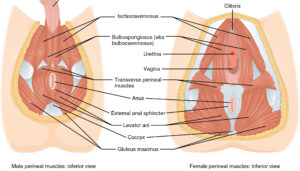What is the pelvic floor?
The pelvic floor muscles are located between the tailbone (coccyx) and the pubic bone within the pelvis. They support the bowel and bladder (as well as the uterus and vagina in females).

Symptoms of pelvic floor dysfunction
The following signs and symptoms can let you know you might have a pelvic floor issue:
- Frequent bathroom visits or failing to reach the bathroom in time
- Having to frequently start and stop when you’re trying to pee
- Straining or pushing to pass a bowel movement
- Having to change positions on the toilet or use your hand to eliminate stool
- Constipation (Experts estimate that up to half of the people with long-term constipation also have pelvic floor dysfunction)
- Leaking stool (fecal incontinence)
- Leaking urine (urinary incontinence)
- Painful urination
- Unexplained low back pain or a feeling of heaviness in the low back region
- Ongoing pain in your pelvic region, genitals or rectum — with or without a bowel movement
- leaking urine when coughing, sneezing, laughing or running
- reduced sensation in the vagina
- tampons that dislodge or fall out
- a distinct bulge at the vaginal opening
- a sensation of heaviness in the vagina
- recurrent urinary tract infections, or recurrent thrush
- vulval pain, pain with sex, inability to orgasm
What causes issues with the pelvic floor
- supporting the weight of the uterus during pregnancy
- vaginal childbirth, which may overstretch the muscles
- the pressure of obesity
- chronic constipation and straining to poop
- constant coughing
- some forms of surgery that require cutting the muscles (including prostate cancer treatment in males)
- lower levels of estrogen after menopause
- pelvic floor muscle tension caused by painful periods, endometriosis
How can PT2Go help?
Pelvic floor therapy has become very common as a conservative, non surgical way to address many issues with the pelvic floor. Our team has undergone continuing education and are certified as pelvic health specialists through the Herman and Wallace Pelvic Rehabilitation Institute
Questions? Interested in our services? Give us a call or email. No referral needed and insurances are accepted!

